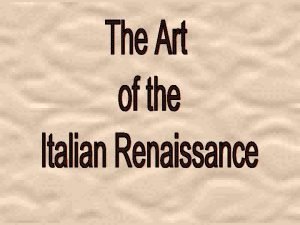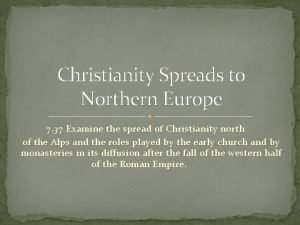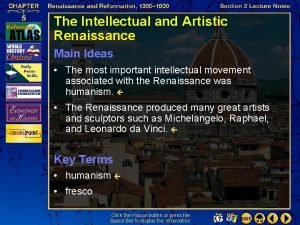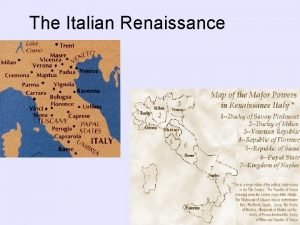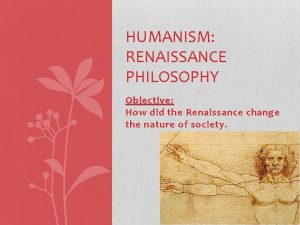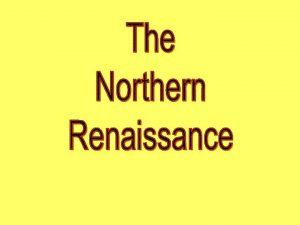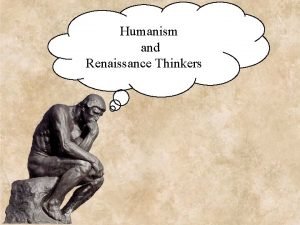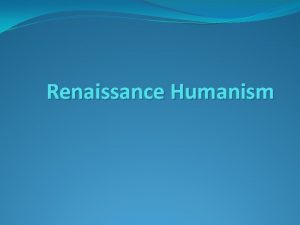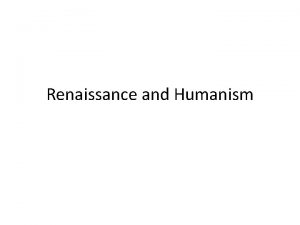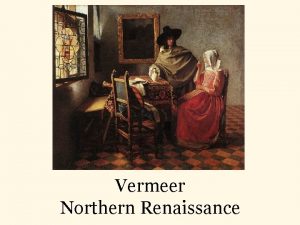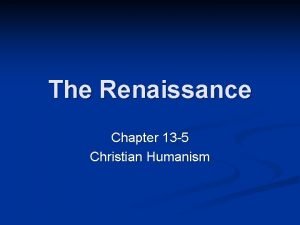THE NORTHERN RENAISSANCE CHRISTIAN HUMANISM Emphasized early church










- Slides: 10

THE NORTHERN RENAISSANCE

CHRISTIAN HUMANISM • Emphasized early church writings that provided answers on how to improve society and reform the church. – There was less emphasis on pagan works from ancient Greece and Rome • (although these works were widely read and enjoyed by Christian Humanists). – Many historians today see more continuity between the Northern and Italian Renaissance than contrasts. – It drew on Hebrew and Greek texts of the Bible and the writings of the church fathers. – Main goal- through education and power of human intellect bring about institutional change and moral improvement. – Its writings led to criticism of the church thus leading to the Reformation.

ERASMUS (1466 -1536) • He was the most famous and celebrated of all northern humanists. • He was the first humanist to earn a living by writing—an extremely impressive achievement. • He was a master of the Greek language. • He made new translations of the Greek and Latin versions of the New Testament to create ‘purer’ editions • In Praise of Folly (1509) – It was a best-seller (only the Bible sold more by 1550) – It was written in Latin; thus is was not intended for mass consumption.

ERASMUS AND THE CHURCH • Erasmus was a devout Catholic who sought to reform the Church, not destroy it. – He satirized people’s worldly ambitions, including the clergy. – He criticized immorality and hypocrisy of Church leaders and the clergy. – The book inspired renewed calls for reform and influenced Martin Luther. • Thus, some contemporaries claimed that “Erasmus lay the egg that Luther hatched” regarding the Reformation.


THOMAS MORE (1478 -1536) • He was a prime example of a civic humanist • He rose to the highest government position of any humanist – Lord Chancellor to King Henry VIII in England.

UTOPIA • It mixes civic humanism with religious ideals to describe a perfect (utopian) society located on an imaginary island. – More sees the accumulation of property as a root cause for society’s ills; a few have it—most don’t. – In order to achieve harmony and order people have to be willing to sacrifice their individual rights for the common good. – War, poverty, religious intolerance, and other problems of the early 16 th century do not exist.

JACQUES LEFEVRE D’ESTABLES (1454 -1536) • He was a leading French humanist and an example of how Northern Christian humanists focused on early Church writings. • He produced 5 versions of the Psalms that challenged a single authoritative version of the Bible – A devout Catholic, he was later seen as an enemy of the Church and condemned for heresy.

JUAN LUIS VIVES (1493 -1540) • He was a Spanish humanist who spent most of his adult life in the Netherlands. – His study of the human psyche has earned him the reputation as “father” of modern psychology. – This illustrates how human beings were now important enough to be studied in depth, as opposed to medieval notions of humans and individuals as unworthy of such study.

WILLIAM SHAKESPEARE (1564 -1616) • He is the greatest of the English Renaissance authors. • His works reflected the Renaissance ideas of classical Greek and Roman culture, individualism and humanism. • He wrote comedies, tragedies, histories and sonnets.
 Humanism emphasized
Humanism emphasized Italian renaissance vs northern renaissance art
Italian renaissance vs northern renaissance art Italian renaissance vs northern renaissance venn diagram
Italian renaissance vs northern renaissance venn diagram Renaissance humanism main idea
Renaissance humanism main idea Renaissance humanism ppt
Renaissance humanism ppt What was a key intellectual movement of the renaissance
What was a key intellectual movement of the renaissance Humanists also stressed the importance of the
Humanists also stressed the importance of the Renaissance humanism characteristics
Renaissance humanism characteristics The northern renaissance began in the cities of
The northern renaissance began in the cities of Define humanism renaissance
Define humanism renaissance Humanism
Humanism
